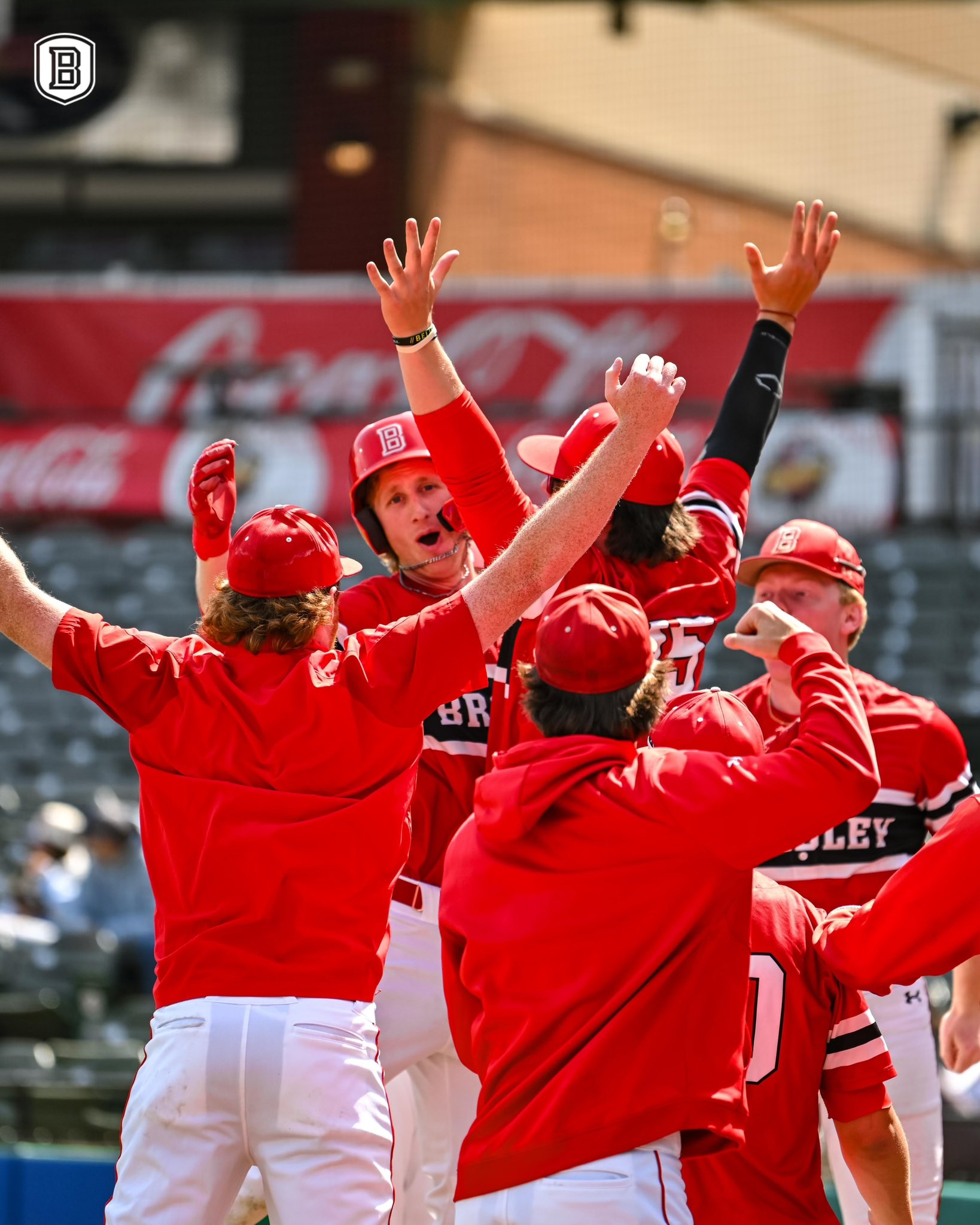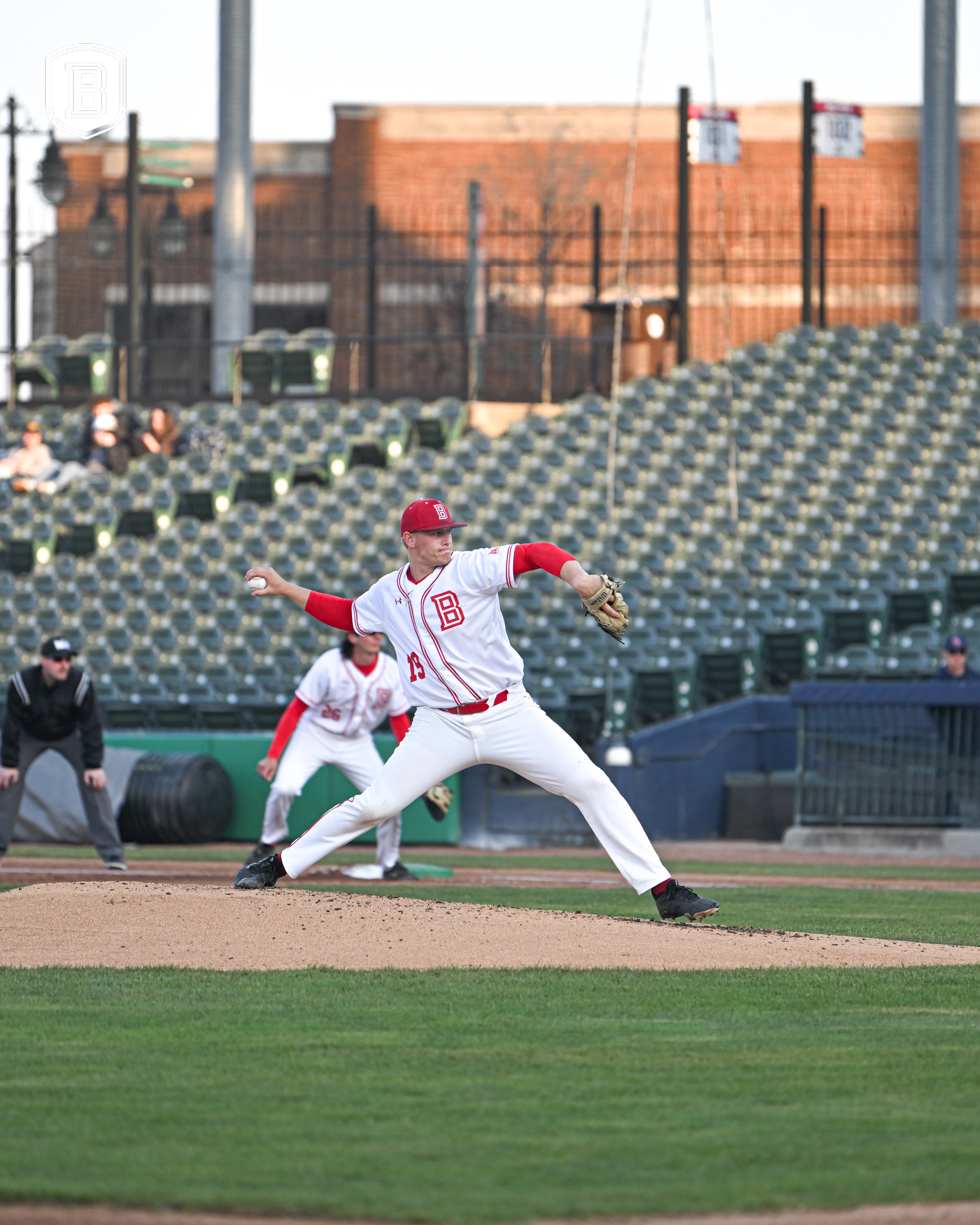
Former Bradley pitcher Anthony Edge stared at his phone Friday afternoon, his stomach tied in knots.
He was frustrated, in an impossible position, feeling like he had exhausted every alternative to what he was about to do.
“I had no other way to voice my frustrations,” Edge said. “I was nervous because I didn’t know how it would be perceived, but I just wanted the truth out there.”
The same tension and frustration were apparent in the tweet he ultimately posted on X, which was accompanied by a screenshot stating claims of wrongdoing by the Bradley Athletics department.
“I never wanted to have to use a platform such as X to get accountability…” he wrote, warning incoming recruits to “know your staff and what values they hold.”
The post came as a shock. There was no public knowledge of any friction during the transition between former head coach Elvis Dominguez and the hiring of the current head coach, Justin Dedman.
Edge’s tweet brought the issue to center stage, with an audience of over 660,000.
His complaints about the transition and the program have also sparked comments from other athletes connected to BU’s baseball program.
The Scout reached out to the Bradley Athletics department for comment on this story, which is based on conversations with five student athletes, and was provided with the following: “The Bradley University Athletics Department continuously demonstrates its ability to uphold the highest levels of integrity and efforts to support its student-athletes across all of its programs. We are deeply committed to the success of our student-athletes in both their athletic and academic pursuits, and remain confident that our track record and high standards in representing the University speak for themselves”.
In his post, Edge claims that he was cut from the team while recovering from a UCL surgery with “no explanation,” “no conversation,” or knowledge of a Designated Student Athlete tag (DSA) that could have protected him against losing his athletic scholarship and being forced to find a new school if Edge was cut due to roster limit changes from the House v. NCAA settlement.
“He didn’t even know my name,” Edge said, describing his recollection of his interaction with Dedman a few days after he was hired. “The call was very brief. He [Dedman] said, ‘I think I’m going to advise you to hit the portal, Mitch’. I asked him if he said Mitch? He said yes. I assumed he was referring to Mitch Ball. I told him my name was Anthony, and then he just readjusted and told me he would still advise me to transfer.”
But even after their post garnered attention online, it was clear that this wasn’t an isolated incident.
Pushed to the Edge
For Edge, the situation reached its most frustrating point not immediately after being cut but weeks later when he learned of the NCAA’s DSA tag. The designation could have allowed him to stay at Bradley without occupying a roster spot. This would also have preserved his eligibility and eased the transfer process while he recovered from an elbow injury.
The DSA tag was introduced as part of this year’s revised House v. NCAA settlement.
According to Article 1, Section 1, a DSA is any student athlete who, “a member institution attests was or would have been removed from the member institution’s 2025-2026 roster due to the implementation of roster limits who was either certified as eligible for practice or competition at the program during the 2024-2025 academic year, before April 7, 2025, including student-athletes who transferred, or enrolled at a program for the 2025-26 academic year who, before April 7, 2025, was recruited to be, or was assured by an institutional staff member they would be, on the member institution’s roster for the 2025-2026 Academic Year.”
Schools had until July 6, 30 days after the settlement’s final approval on June 6, to submit DSA applications.
Institutions are encouraged to designate eligible athletes, but are not required to do so. Athletes granted DSA status could retain the designation even if they transferred, allowing them to join new programs without counting against roster limits. This made it a crucial safeguard for injured players like Edge.
But Edge only learned about the DSA tag on the day of the deadline.
“I learned of the DSA tag from my Dad, just kind of, you know, scrolling social media or whatever,” Edge said. “When we looked it up, it was like, wow, this fits exactly my scenario.”
After learning about the DSA, Edge contacted Chris Reynolds, the Vice President of Intercollegiate Athletics, T.J. Christie, the Senior Associate for Marketing and Fan Engagement, and Dedman.
Instead of receiving answers for not being told about the tag, Edge claims he was met with confusion after mixed messages and Dedman’s unwillingness to act.
“He pretty much flat-out told me that he doesn’t owe me an explanation for anything,” Edge remarked in describing his memory of the conversation. “I was talking to TJ Christie, who is Chris Reynolds’ assistant, and you know, he felt for me, but he said that it’s ultimately up to the coach’s decision if that DSA were to get sent through or not through the NCAA,” Edge said. “When I called Dedman, he told me that it was the other way around, and he said that I had to deal with the athletic directors for that.”
Caught between what he believed were conflicting messages and passed responsibility, Edge felt stuck.
“I’ve been trying to figure things out with Dedman and the athletic staff… since this all went down, and I’ve gotten not very far,” Edge said.
Knowing what the DSA could have meant—not just at Bradley but beyond — made the situation more painful for Edge.
“If I had the DSA tag, you know, that opens up some opportunities if I wanted to transfer out, because schools, they’re not going to take a chance on a kid who’s injured and who they also have to give a roster spot to,” Edge said. “Knowing that complications could arise… They can’t just waste a roster spot.”
As Edge publicly disclosed his experience, several former teammates — including outfielders Dominic Anselmo and Christian Mittleman, pitchers Tate Roley, Nick Hainline and Travis Lutz, and infielder Beau Durbin—rallied behind him. Many shared similar accounts of miscommunication and mismanagement by Bradley’s athletic department.
Their social media posts were startling in tone, but didn’t appear to be impulsive. They reflected weeks of uncertainty, silence and disappointment.
To understand why Edge and others felt compelled to speak out, you must return to the end of Bradley’s 2024 baseball season and the following chain of events.
Braves rally, but Dominguez retires
As the final out landed in a Belmont glove and ended Bradley’s season in the Missouri Valley Conference Tournament, disappointment and hope filled the dugout.
The Braves lost to the Bruins 11-7, closing a 16-35 season—Bradley’s third straight with fewer than 20 wins.
But this one felt different.
The team surged after a 4-31 start, winning 12 of their last 16 and reaching the MVC tournament. The scoreboard stung, but hope had returned. Players were already thinking about next season.
Then, before the bus ride back to Peoria, everything changed.
Head coach Elvis Dominguez, who had been at the helm for nearly two decades, delivered one final postgame speech: he was retiring.
Bittersweet became stone-cold. Sadness, shock and uncertainty set in as players grappled with what his departure meant.
“The mood was as high as it’s ever been in my two seasons at Bradley,” Roley said. “We were winning rapidly and seemed to have things turned around. We thought the coaches would stick with us, continue the winning and trending program in a positive direction.”

“He told us he was retiring after our last game,” Roley continued. “It was a group meeting with a lot of shock and confusion about why. He seemed sad to be done with coaching, but it seemed as if the administration was just as tough for him to work under as it was for us to play under.”
The Scout reached out to Dominguez on Tuesday, but received no response to a message left for him.
The Emergency meeting
After the players arrived back on the hilltop, Reynolds, Bradley’s Vice President of Intercollegiate Athletics, called an emergency meeting to quell their concerns and answer any questions regarding the coaching search and their future with the program.
The meeting started with a message from newly appointed President James Shadid, an alumnus and former Bradley Baseball player.
Shadid was away from Peoria, but players say he called to reaffirm his support of the program and pledge to do his best to enhance it going forward.
When Shadid was done speaking to the players, the players said that Reynolds began to address the team. He thanked the players for their hard work to end the season, thanked coach Dominguez (who was not present) for the 17 years he gave to Bradley and then began to detail the process of starting a national search for the new head coach.
According to players, Reynolds said it would be a 10- to 14-day process, assisted by a search firm that the athletics department would pay to help find candidates.
He then opened the floor for questions.
During the meeting, one of the most significant points of contention was what players felt was the athletics department’s apparent lack of focus and resources on the program. Last season, the players and coaches became frustrated with the lack of home games at Dozer Park and being unable to practice at times throughout the season.
Bradley shares Dozer Park with the Peoria Chiefs and plays just 11 of 51 games at home. The team even had to play “home” games at other schools and practice at “The Yard,” an indoor sports complex in Peoria, and the Louisville Slugger Sports Complex.
Still, neither complex is always readily available due to use by other programs and teams around Peoria.
“We had a lot of problems with field time,” Hainline explained. “We didn’t start practice at Dozer until a couple of weeks into our season. We would never really know where we would practice until the day of. We would have to make 20-30 minute drives to practice at the Dome or the Yard.”
“When we did practice at Dozer Park, we would have the time of our lives,” Hainline continued. “We looked like a really good team and we looked ready to battle in the game, but we just never got the opportunities to practice there.”

The players reiterated these concerns and asked Reynolds what he planned to do to fix things. Dozer is reportedly set to be unavailable in the fall as work is done on the field, leaving the Braves without a consistent place to train.
Again, Reynolds reassured the players that he would do everything he could to improve the program’s situation with Shadid’s help and stated that he wanted players to stay at Bradley, athletes said. He emphasized to the players that they weren’t alone in their frustration and that things would change now that they had a president who is very interested in Athletics.
However, when the players asked how soon they would receive a permanent field to play and practice at, Reynolds could not get into specifics at the time, saying that he still needed to speak with Dozer and wouldn’t be able to give them a timeline, players recalled.
“[Reynolds] talked about plans to make something permanent, and that’s great, but then we asked about the plans, and he couldn’t elaborate,” Lutz said. “We asked about the permanent spot, maybe a location or an estimate, but he couldn’t say because he hadn’t talked to Dozer. We could have used him talking to Dozer for us in April or May when we played home games at other places. It felt like there was no support coming from our athletic director.”

“During the meeting, one of our captains, Nick Hosie, asked a question,” Lutz continued, recalling one of his takeaways from the meeting. “He asked Reynolds if he could name the four named captains of our team and point them out. It was put on Bradley’s athletics website. It was posted on Bradley baseball’s Twitter, Instagram and Facebook. He couldn’t name one of them. Only one of the captains had run out of eligibility. Three of us had more time to play. Now we’re all leaving because of the way they handled everything.”
The Aftermath
In the two weeks between the meeting and Dedman’s hiring, players reportedly tried to push for former pitching coach Andrew Werner to be selected for the job. Werner had been with Bradley since 2020 and was a big part of the Braves’ turnaround this season.
“Plenty of guys talked to him [Reynolds] during that week,” Lutz said. “Ninety percent of guys on the team wanted Coach Werner and were advocating for him. The team was trying to advocate for Werner. The administration wanted to go a different route. If Werner was hired, I think at least 60% of the team would return.”
“From what I remember, we had a core group that played a large part in our good finish, heavily considering coming back if we hired our pitching coach, to have a coach we knew and recruited us, “Roley added. “The administration went in another direction.”
Lutz and numerous other players entered the portal after the meeting, but Reynolds reportedly promised the players who wanted to remain at Bradley a secure spot even when the new coach was hired.
According to multiple players, the athletic director said their roster spots were safe if they did not hear directly from him or his assistant, Christie, that they were cut.
Despite the alleged promise, Dedman reportedly cut numerous players from the team.
“The day after being told a new coach would be hired, all players were told they had a spot on the Bradley roster, and our athletic director was not into coaches cleaning house,” Anselmo said in a post on X. “He told us that if cuts were made, they would happen before the head coach position was settled. Players on our team who were promised to be welcome back were cut. Cuts were made over a phone call by a coach who knew nothing about us.”
Dedman was said to have evaluated players based on a review of their film, stats and intel from the athletics department. Eight players from last year’s team returned this season, along with eight freshmen who had already committed to Bradley.
“Coach Dedman was the one who contacted me and let me know I was cut, “Hainline said, describing his recollection of the conversation. “He told me that they looked through film, stats and asked around the program and gave me he unfortunate news that I did not have a spot on the team next year and that I would need to ‘go ahead and enter the portal’.”
Ultimately, the issue was not being cut for many of the players. Being let go is a reality many players face every year, especially when new coaches are hired.
“If Chris Reynolds and TJ Christie told us, ‘okay we’re going to hire a coach from outside of Bradley, and we’re going to back him, we can’t promise he’ll keep you or not, take that as you will’, then we would have all been like okay we’re prepared for a new coach to do what a new coach does, and bring in his guys he wants,” Lutz said. “It’s a business, and we as players understand that part, so there would be no hard feelings on being cut by a new coach. But they didn’t. They said the complete opposite and couldn’t keep their word. I would assume they didn’t tell Dedman what they told us. It all started from the promise they gave us in that meeting.”
The issue is that players feel they were given false hope, a reason to be brave, but their worst fears came to fruition instead.
The Bradley Athletics department is reportedly working with Edge to solve his problem.

